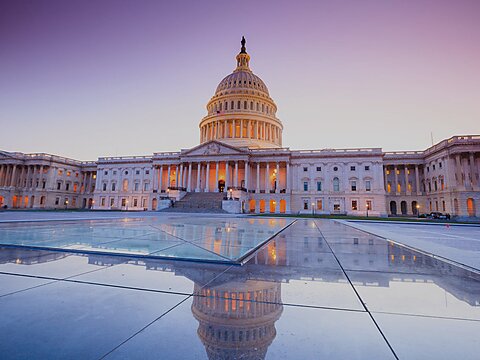The Senate is rushing to vote on its version of the “One Big Beautiful Bill Act.” Republicans are using the budget reconciliation process to cut spending, extend the 2017 tax cuts, reform health care, increase border and defense funding, and deliver on many of President Trump’s campaign promises.
Overall, the Senate bill is significantly more pro-growth than the previously passed House version, largely due to permanent full expensing and other business tax reforms. The bills include a partial repeal of the Inflation Reduction Act (IRA) green energy subsidies, a welcome rollback of distortionary tax preferences. But both bills are packed with new and expanded tax credits and deductions that increase complexity, open doors to avoidance, and deliver little long-term growth. Worse, the Senate bill violates the House’s agreed-upon fiscal guardrails.
The Congressional Budget Office (CBO) estimates the Senate bill will add $3.3 trillion to primary (non-interest) deficits and likely another trillion or more dollars of interest costs and temporary tax policy gimmicks. The bill may still change as senators offer amendments. But as it currently stands, the large tax cuts, paired with insufficient spending cuts, mean that it violates the critical Fiscal Framework agreed to in the House budget resolution.
Breaking this agreement should be a deal-breaker for House and Senate fiscal hawks. But permanent, pro-growth tax reform is within reach. Lawmakers can rein in the explosion of new and expanded tax breaks, roll back existing subsidies, and pair tax cuts with meaningful spending reductions.
More Growth
The bill permanently extends key provisions of the 2017 Tax Cuts and Jobs Act, including lower individual tax rates, a higher estate tax exemption, and, most importantly, immediate deductions for business investment (called full expensing). Deductions for equipment, machinery, and R&D are made permanent. The bill also temporarily extends similar treatment to a new category of “qualified production property,” mostly manufacturing structures. While industry-specific carveouts are not ideal, permanent expensing for structures would be among the most pro-investment reforms Congress could pursue.
Thanks to these permanent provisions, the Tax Foundation estimates the bill will grow the economy by 1.1 percent over the long run, boosting investments, wages, and jobs, resulting in about $900 billion of dynamic revenues (20 percent of the static revenue loss). The House bill left these pro-growth incentives to expire, making it far less effective. Temporary tax cuts simply don’t move long-run investment or growth.
More Subsidies
Unlike the 2017 tax bill, which lowered rates by curbing special-interest tax breaks, this bill heads in the opposite direction, except for its commendable, but partial, repeal of green energy subsidies.
The Senate bill includes $509 billion in new or expanded tax credits, deductions, exclusions, and other pork, according to Arnold Ventures. These preferences carry real fiscal costs, add complexity, and deliver little long-term growth.
Among the biggest giveaways: a fourfold increase in the $10,000 state and local tax (SALT) deduction cap, a federal subsidy to high-income taxpayers that encourages high-tax states to tax even more. Trump’s pledges to exempt tips and overtime pay are also included, with added guardrails in the Senate text. A $6,000 expansion of the deduction for the elderly nods to Trump’s promise to eliminate taxes on Social Security. The bill also creates “Trump Accounts,” complex child investment accounts seeded with $1,000 of taxpayer money. All of these provisions expire after 2028, hiding their true long-run cost.
The Senate also keeps all the House’s targeted tax breaks for children, employer childcare, paid leave, housing, student loans, seafood processing, rural development, farmers, adoption, and biofuels. On top of that, it adds new subsidies for economic development, advanced manufacturing, Alaskan whaling, remote native villages, and rum distillers in Puerto Rico and the US Virgin Islands.
Each of these is a complex, targeted tax preference, given at the expense of lower tax rates for all Americans.
One bright spot is the $517 billion repeal of the Inflation Reduction Act’s green energy tax credits (about 60 percent of the total). These credits have proven costly and inefficient. Lawmakers should repeal more of these subsidies.
More Debt
The Senate bill is estimated to reduce revenue $4.5 trillion from the traditional CBO baseline over ten years (compared to the House’s $3.7 trillion). Both versions of the bill cut roughly $1.2 trillion in net spending. Thus, the House bill would increase primary (non-interest) deficits by $2.4 trillion. The Senate’s deficit effect clocks in at $3.3 trillion over ten years.
While far from fiscally sound, the House bill at least included a Fiscal Framework requiring any tax cuts beyond $2.5 trillion to be offset by additional spending cuts. To meet that standard, the Senate must find roughly $450 billion in additional offsets. That could mean more spending cuts or trimming half a trillion in new anti-growth tax subsidies.
Both versions of the reconciliation bill are likely to add additional trillions to the debt because they include many temporary tax cuts (more so in the House) and delay the most significant spending and tax credit reforms, daring future Congresses to cancel the savings.
Conclusion
Lawmakers should prioritize fiscal responsibility by staying within the fiscal guardrails agreed to in the House budget Fiscal Framework. Permanent, pro-growth tax reform is eminently doable by eliminating or scaling back the flood of new and expanded tax preferences, repealing costly subsidies already in the tax code, and cutting additional spending.
For a more in-depth analysis of the bills, see the following Substack posts:
“Tax Tracker | A Reading Guide for the Evolving Tax Bills”
“Debt Digest | One Big Bloated Blunder: What’s Wrong with the Senate’s Reconciliation Bill”












